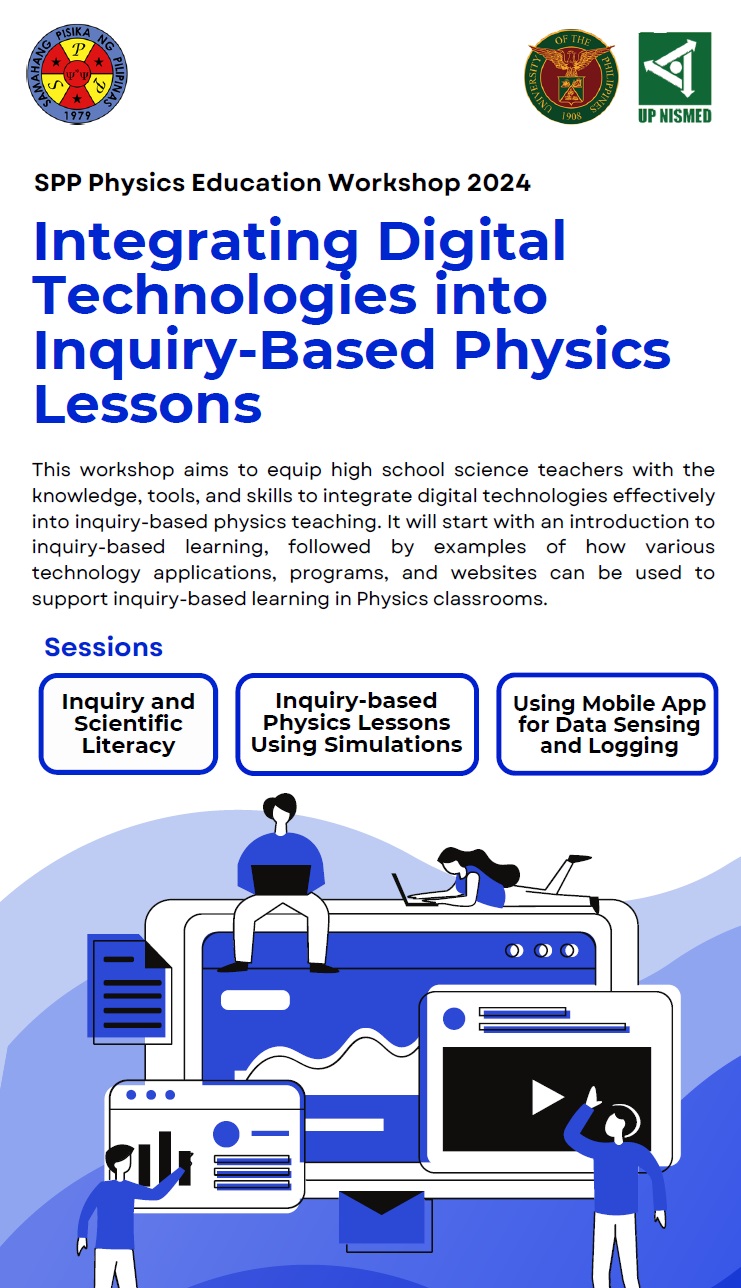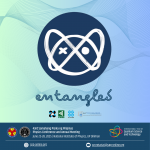SPP and the UP National Institute for Science and Mathematics Education Development (UP-NISMED), will be conducting the 2024 Physics Education Workshop Integrating Digital Technologies into Inquiry-Based Physics Lessons. This workshop will take place on 5 July 2024 at the Batangas State University, Pablo Borbon Campus.

This workshop aims to equip high school science teachers with the knowledge, tools, and skills to integrate digital technologies effectively into inquiry-based physics teaching. It will start with an introduction to inquiry-based learning, followed by examples of how various technology applications, programs, and websites can be used to support inquiry-based learning in Physics classrooms. The said workshop will be done simultaneously with the Physics Conference and Annual Meeting.
Tentative Program
5 July 2024
8:30 – 9:00 AM
Opening Program
9:00 – 10:00 AM
Inquiry and Scientific Literacy
10:00 AM – 12:00 NN
Inquiry-based Physics Lessons Using Simulations
12:00 NN – 1:00 PM
Lunch Break
1:00 – 3:30 PM
Using Mobile App for Data Sensing and Logging
3:30 – 4:00 PM
Closing Program and Group Photo

Workshop Details
Title
Integrating Digital Technologies into Inquiry-Based Physics Lessons
Abstract
Scientific literacy encompasses knowledge of science, science-based technologies, and an understanding of common procedures and processes associated with scientific inquiry. A scientifically literate person can actively participate in science discourse, make informed choices regarding scientific matters, and contribute to decision-making concerning science-related issues. As such they can address both personal and societal challenges by utilizing their
knowledge of science and its processes.
However, the recent findings from PISA 2022 highlight a concerning gap in scientific proficiency among 15-year-old Filipino students. Only 2 out of 10 achieved level 2 or above on the Science proficiency scale, which ranges from 1b (lowest) to 6 (highest). This indicates that only 20% of our 15-year-olds are capable of recognizing explanations for familiar scientific phenomena using data or evidence gathered from simple investigations.
Some research indicates the role of inquiry-based approaches in enhancing scientific literacy within educational frameworks. In the classroom setting, fostering inquiry can be achieved through designing science activities and investigations that embody the principles of inquiry-based instruction. Such interventions not only deepen conceptual understanding but also cultivate critical thinking skills essential for navigating the complexities of the modern world.
Inquiry-based activities, which emphasize student exploration and hands-on learning, can be significantly enhanced by digital technologies. Digital technologies serve as a low-cost, interactive platform for implementing inquiry-based activities.
This workshop aims to equip high school science teachers with the knowledge, tools, and skills
to integrate digital technologies effectively into inquiry-based physics teaching. It will start with
an introduction to inquiry-based learning, followed by examples of how various technology applications, programs, and websites can be used to support inquiry-based learning in Physics classrooms.
PPST Alignment
Domain 1 Content Knowledge and Pedagogy
Positive use of ICT
Strategies for developing critical and creative thinking, as well as other higher-order thinking
skills
Domain 4 Curriculum and Planning
Teaching and learning resources including ICT




